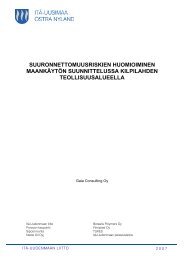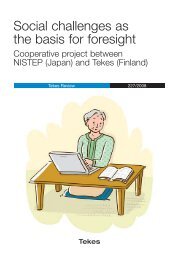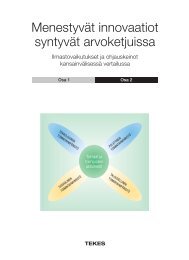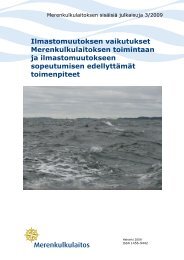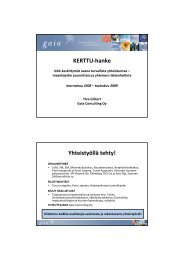Climate Risk Management in Finnish Development Cooperation - Gaia
Climate Risk Management in Finnish Development Cooperation - Gaia
Climate Risk Management in Finnish Development Cooperation - Gaia
Create successful ePaper yourself
Turn your PDF publications into a flip-book with our unique Google optimized e-Paper software.
Appendix<br />
Annex I. Ethiopia <strong>Climate</strong> Change Implications for F<strong>in</strong>land<br />
<strong>Climate</strong> change is one of the central challenges fac<strong>in</strong>g humanity <strong>in</strong> the 21st century. The way <strong>in</strong><br />
which we will address it will have profound implications for human development <strong>in</strong> different parts of<br />
the planet.<br />
This annex studies some of the climate challenges that Ethiopia is already fac<strong>in</strong>g and what the<br />
implications could mean for F<strong>in</strong>land. The cases, which are look<strong>in</strong>g at the potential implications<br />
through trade, security, conflict and human displacement <strong>in</strong>terl<strong>in</strong>kages highlight the urgent need to<br />
strengthen the adaptive capacity of a country such as Ethiopia <strong>in</strong> view of on-go<strong>in</strong>g and still<br />
accelerat<strong>in</strong>g climate change.<br />
While po<strong>in</strong>t<strong>in</strong>g out several important <strong>in</strong>terl<strong>in</strong>kages that have to be taken <strong>in</strong>to account <strong>in</strong> Ethiopian<br />
and F<strong>in</strong>nish-Ethiopian development efforts, the cases provide a strong argument for keep<strong>in</strong>g the<br />
focus of developed countries <strong>in</strong> particular, and the more advanced develop<strong>in</strong>g countries, on<br />
immediate and considerable climate mitigation efforts – adaptation is necessary but only part of a<br />
susta<strong>in</strong>able long-term solution.<br />
<strong>Climate</strong> change and trade<br />
Introduction<br />
In order to assess impacts of climate change to a country’s economy, it is necessary to have<br />
estimates of the impacts and costs of climate change (be it gradual temperature <strong>in</strong>creases, changed<br />
precipitation patters, <strong>in</strong>creased climate variability or weather extremes) on different socio-economic<br />
activities. In many countries <strong>in</strong>formation (qualitative and quantitative) on costs is not readily<br />
available. In particular <strong>in</strong> develop<strong>in</strong>g countries climate data on observed climatic changes is rarely<br />
recorded <strong>in</strong> a consistent manner over time, and where it exists it is often <strong>in</strong> a form that requires<br />
additional work before it can be used.<br />
However, certa<strong>in</strong> overall trends and requirements for socio-economic transformations, due to<br />
climate change and policy responses thereto, can be identified. <strong>Climate</strong> change will have<br />
implications for economic activities through production, consumption and <strong>in</strong>ternational trade.<br />
<strong>Climate</strong> change may h<strong>in</strong>der economic growth and thereby also worsen poverty and social <strong>in</strong>stability<br />
(see more on climate change and conflict <strong>in</strong> Chapter 2). Figure 1 presents how greenhouse gas<br />
emissions create socio-economic impacts. Respond<strong>in</strong>g to climate change will require a fundamental<br />
41



